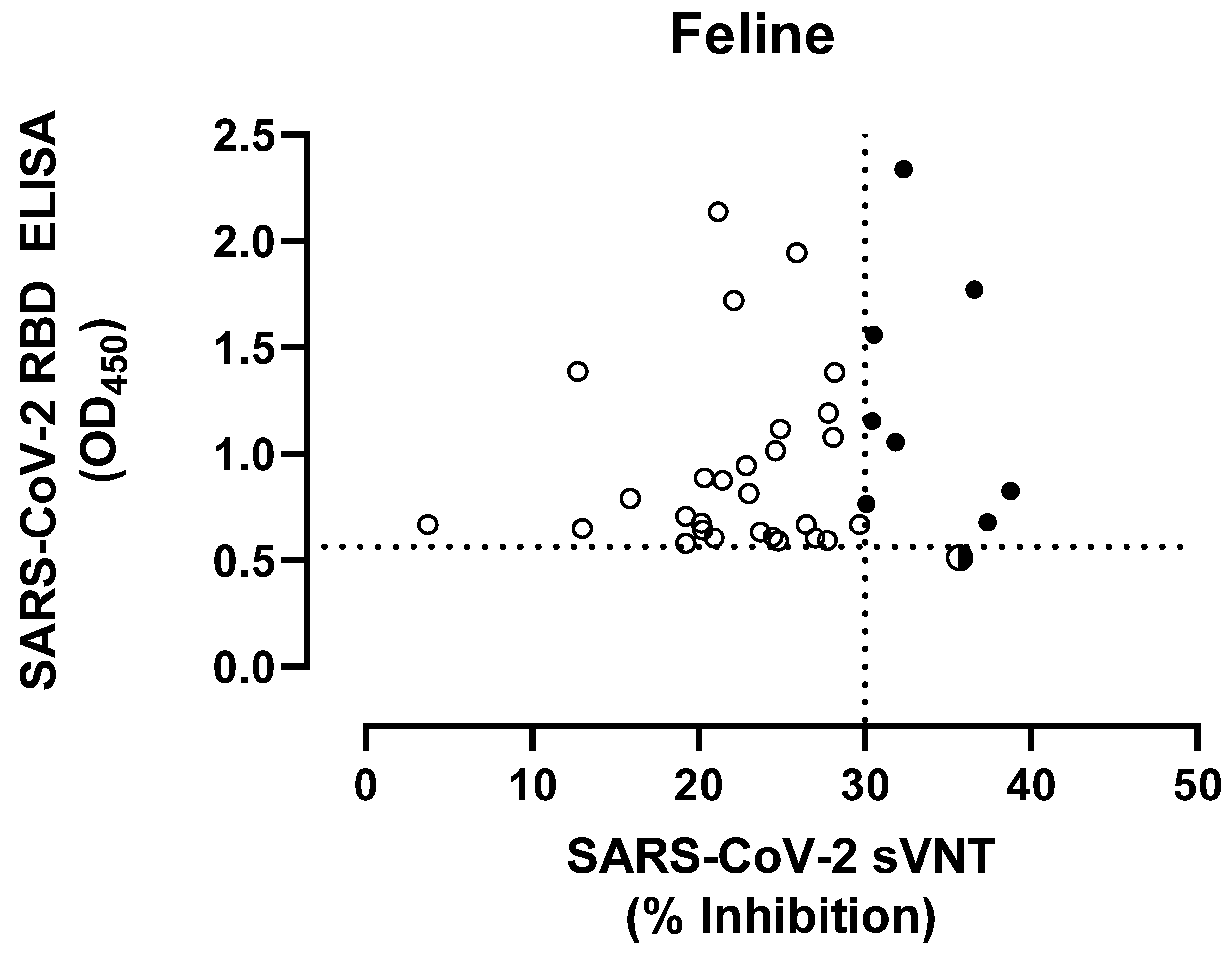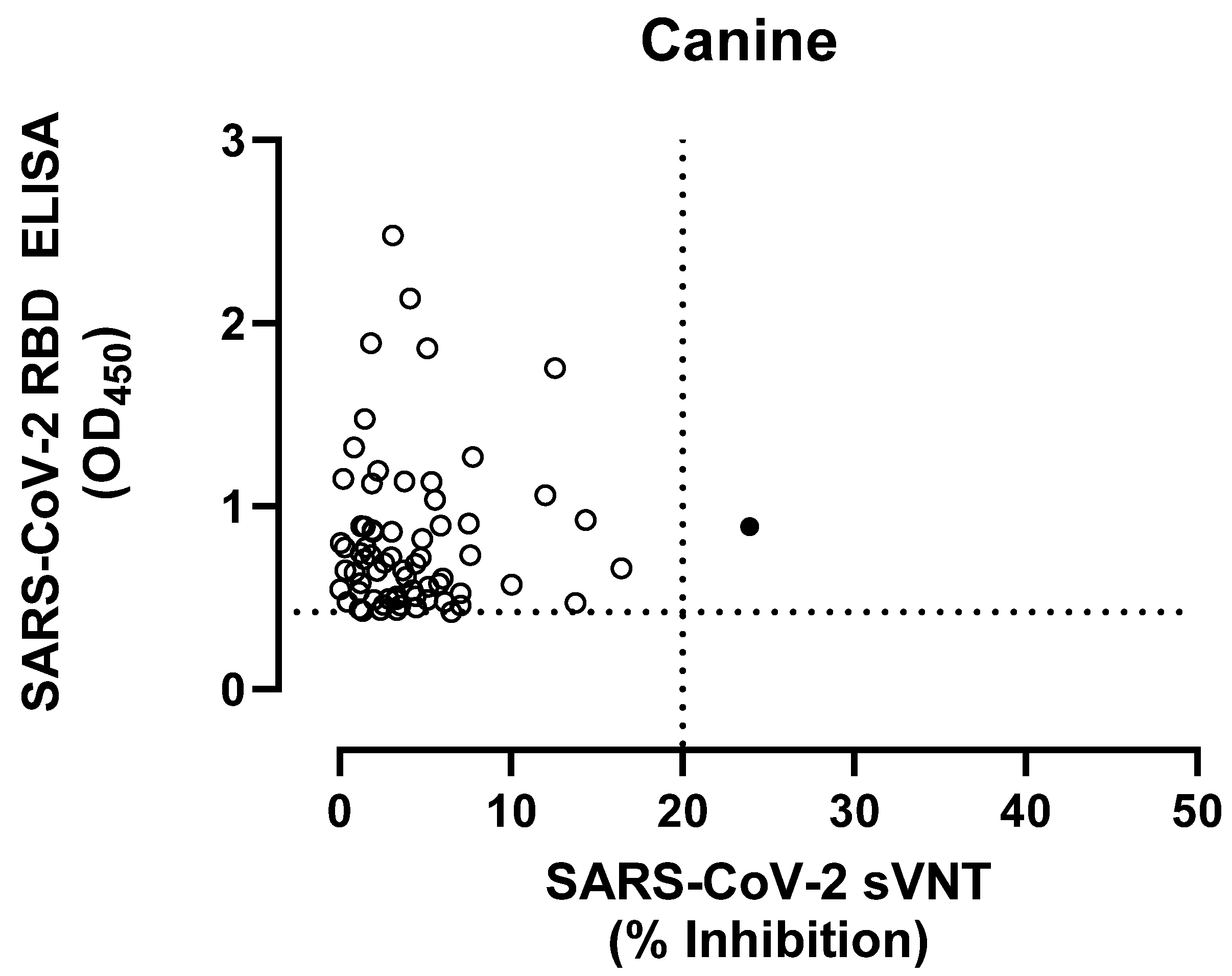Submitted:
12 January 2023
Posted:
13 January 2023
You are already at the latest version
Abstract
Keywords:
1. Introduction
2. Materials and Methods
2.1. Sample description
Seoul, Korea
Hong Kong, China
2.2. Assay description and optimisation
2.3. Confirmatory Serological Tests: Surrogate Virus Neutralization and Plaque Reduction Neutralization tests
2.4. Detection of SARS-CoV-2 RNA shedding in oronasal secretions of healthy-free roaming cats in Hong Kong by RT-PCR
2.5. Statistical Analyses
3. Results
3.1. Intra- and inter-assay coefficients of variation (CV)
3.2. SARS-CoV-2 seroprevalence in domestic cats
3.3. SARS-CoV-2 seroprevalence in domestic dogs
3.4. Prevalence of SARS-CoV-2 RNA shedding in oronasal secretions of healthy-free roaming cats in Hong Kong-
Discussion
Author Contributions
Funding
References
- Ludwig, S. and A. Zarbock, Coronaviruses and SARS-CoV-2: A Brief Overview. Anesth Analg, 2020. 131(1): p. 93-96. [CrossRef]
- Voskarides, K., Animal-to-Human Viral Transitions: Is SARS-CoV-2 an Evolutionarily Successful One? J Mol Evol, 2020. 88(5): p. 421-423. [CrossRef]
- Wang, H., et al., The genetic sequence, origin, and diagnosis of SARS-CoV-2. Eur J Clin Microbiol Infect Dis, 2020. 39(9): p. 1629-1635. [CrossRef]
- Guan, Y., et al., Isolation and characterization of viruses related to the SARS coronavirus from animals in southern China. Science, 2003. 302(5643): p. 276-8. [CrossRef]
- Cavanagh, D., Nidovirales: a new order comprising Coronaviridae and Arteriviridae. Arch Virol, 1997. 142(3): p. 629-33.
- Graham, R.L. and R.S. Baric, Recombination, reservoirs, and the modular spike: mechanisms of coronavirus cross-species transmission. J Virol, 2010. 84(7): p. 3134-46. [CrossRef]
- Fung, T.S. and D.X. Liu, Human Coronavirus: Host-Pathogen Interaction. Annu Rev Microbiol, 2019. 73: p. 529-557. [CrossRef]
- de Wit, E., et al., SARS and MERS: recent insights into emerging coronaviruses. Nat Rev Microbiol, 2016. 14(8): p. 523-34. [CrossRef]
- Wong, G., et al., Zoonotic origins of human coronavirus 2019 (HCoV-19 / SARS-CoV-2): why is this work important? Zool Res, 2020. 41(3): p. 213-219. [CrossRef]
- Azhar, E.I., et al., Evidence for camel-to-human transmission of MERS coronavirus. N Engl J Med, 2014. 370(26): p. 2499-505. [CrossRef]
- Reusken, C.B., et al., Middle East respiratory syndrome coronavirus neutralising serum antibodies in dromedary camels: a comparative serological study. Lancet Infect Dis, 2013. 13(10): p. 859-66. [CrossRef]
- Lu, R., et al., Genomic characterisation and epidemiology of 2019 novel coronavirus: implications for virus origins and receptor binding. Lancet, 2020. 395(10224): p. 565-574. [CrossRef]
- Latif, A.A. and S. Mukaratirwa, Zoonotic origins and animal hosts of coronaviruses causing human disease pandemics: A review. Onderstepoort J Vet Res, 2020. 87(1): p. e1-e9. [CrossRef]
- Zhou, P., et al., A pneumonia outbreak associated with a new coronavirus of probable bat origin. Nature, 2020. 579(7798): p. 270-273. [CrossRef]
- Sit, T.H.C., et al., Infection of dogs with SARS-CoV-2. Nature, 2020. 586(7831): p. 776-778. [CrossRef]
- Barrs, V.R., et al., SARS-CoV-2 in Quarantined Domestic Cats from COVID-19 Households or Close Contacts, Hong Kong, China. Emerg Infect Dis, 2020. 26(12): p. 3071-3074. [CrossRef]
- Newman, A., et al., First Reported Cases of SARS-CoV-2 Infection in Companion Animals - New York, March-April 2020. MMWR Morb Mortal Wkly Rep, 2020. 69(23): p. 710-713. [CrossRef]
- Prince, T., et al., SARS-CoV-2 Infections in Animals: Reservoirs for Reverse Zoonosis and Models for Study. Viruses, 2021. 13(3). [CrossRef]
- Kok, K.H., et al., Co-circulation of two SARS-CoV-2 variant strains within imported pet hamsters in Hong Kong. Emerg Microbes Infect, 2022. 11(1): p. 689-698. [CrossRef]
- Pickering, B., et al., Divergent SARS-CoV-2 variant emerges in white-tailed deer with deer-to-human transmission. Nat Microbiol, 2022. 7(12): p. 2011-2024. [CrossRef]
- Pagani, G., et al., Human-to-Cat SARS-CoV-2 Transmission: Case Report and Full-Genome Sequencing from an Infected Pet and Its Owner in Northern Italy. Pathogens, 2021. 10(2). [CrossRef]
- Hosie, M.J., et al., Detection of SARS-CoV-2 in respiratory samples from cats in the UK associated with human-to-cat transmission. Vet Rec, 2021. 188(8): p. e247. [CrossRef]
- Garigliany, M., et al., SARS-CoV-2 Natural Transmission from Human to Cat, Belgium, March 2020. Emerg Infect Dis, 2020. 26(12): p. 3069-3071. [CrossRef]
- Piewbang, C., et al., SARS-CoV-2 Transmission from Human to Pet and Suspected Transmission from Pet to Human, Thailand. J Clin Microbiol, 2022. 60(11): p. e0105822. [CrossRef]
- Hamer, S.A., et al., SARS-CoV-2 Infections and Viral Isolations among Serially Tested Cats and Dogs in Households with Infected Owners in Texas, USA. Viruses, 2021. 13(5). [CrossRef]
- Goryoka, G.W., et al., One Health Investigation of SARS-CoV-2 Infection and Seropositivity among Pets in Households with Confirmed Human COVID-19 Cases-Utah and Wisconsin, 2020. Viruses, 2021. 13(9). [CrossRef]
- Fritz, M., et al., High prevalence of SARS-CoV-2 antibodies in pets from COVID-19+ households. One Health, 2021. 11: p. 100192. [CrossRef]
- Michelitsch, A., et al., Occurrence of Antibodies against SARS-CoV-2 in the Domestic Cat Population of Germany. Vaccines (Basel), 2020. 8(4). [CrossRef]
- Stevanovic, V., et al., Seroprevalence of SARS-CoV-2 infection among pet animals in Croatia and potential public health impact. Transbound Emerg Dis, 2021. 68(4): p. 1767-1773. [CrossRef]
- Zhao, S., et al., Serologic Screening of Severe Acute Respiratory Syndrome Coronavirus 2 Infection in Cats and Dogs during First Coronavirus Disease Wave, the Netherlands. Emerg Infect Dis, 2021. 27(5): p. 1362-1370. [CrossRef]
- Patterson, E.I., et al., Evidence of exposure to SARS-CoV-2 in cats and dogs from households in Italy. Nat Commun, 2020. 11(1): p. 6231. [CrossRef]
- Thematic Household Survey Report, No. 66 – Keeping of Dogs and Cats. 2019, Census and Statistics Department, Hong Kong SAR.
- Ministry of Agriculture, F., and Rural Affairs. 8.60 million companion animals are raised in 6.38 million households nationwide 2021 [cited 2022 Nov. 01]; Available from: https://www.mafra.go.kr/mafra/293/subview.do?enc=Zm5jdDF8QEB8JTJGYmJzJTJGbWFmcmElMkY2OCUyRjMyNjk3MCUyRmFydGNsVmlldy5kbyUzRg%3D%3D (in Korean).
- Sit, T.H.C., et al., Infection of dogs with SARS-CoV-2. Nature, 2020. [CrossRef]
- Perera, R.A., et al., Serological assays for severe acute respiratory syndrome coronavirus 2 (SARS-CoV-2), March 2020. Euro Surveill, 2020. 25(16). [CrossRef]
- Deshpande, S.S., Enzyme Immunoassays: From Concept to Product Development. 1996, New York: Chapman & Hall.
- Donnik, I.M., et al., Coronavirus Infections of Animals: Future Risks to Humans. Biol Bull Russ Acad Sci, 2021. 48(1): p. 26-37. [CrossRef]
- SAR, T.G.o.H.K. Local situation dashboard. Available from: https://www.coronavirus.gov.hk/eng/index.html.
- Schulz, C., et al., SARS-CoV-2-Specific Antibodies in Domestic Cats during First COVID-19 Wave, Europe. Emerg Infect Dis, 2021. 27(12): p. 3115-3118. [CrossRef]
- Klaus, J., et al., Detection and Genome Sequencing of SARS-CoV-2 in a Domestic Cat with Respiratory Signs in Switzerland. Viruses, 2021. 13(3). [CrossRef]
- Perera, R., et al., Evaluation of a SARS-CoV-2 Surrogate Virus Neutralization Test for Detection of Antibody in Human, Canine, Cat, and Hamster Sera. J Clin Microbiol, 2021. 59(2). [CrossRef]
- Tan, C.W., et al., A SARS-CoV-2 surrogate virus neutralization test based on antibody-mediated blockage of ACE2-spike protein-protein interaction. Nat Biotechnol, 2020. 38(9): p. 1073-1078. [CrossRef]
- Jiang, S., C. Hillyer, and L. Du, Neutralizing Antibodies against SARS-CoV-2 and Other Human Coronaviruses: (Trends in Immunology 41, 355-359; 2020). Trends Immunol, 2020. 41(6): p. 545. [CrossRef]
- Dileepan, M., et al., Seroprevalence of SARS-CoV-2 (COVID-19) exposure in pet cats and dogs in Minnesota, USA. Virulence, 2021. 12(1): p. 1597-1609. [CrossRef]
- Felten, S., et al., Correlation of Feline Coronavirus Shedding in Feces with Coronavirus Antibody Titer. Pathogens, 2020. 9(8). [CrossRef]
- Klaus, J., et al., SARS-CoV-2 Infection in Dogs and Cats from Southern Germany and Northern Italy during the First Wave of the COVID-19 Pandemic. Viruses, 2021. 13(8). [CrossRef]
- Ito, G., et al., Seroprevalence of antibodies against severe acute respiratory coronavirus 2 (SARS-CoV-2) in household dogs in Japan. J Vet Med Sci, 2021. 83(11): p. 1722-1725. [CrossRef]
- Barroso-Arevalo, S., et al., Large-scale study on virological and serological prevalence of SARS-CoV-2 in cats and dogs in Spain. Transbound Emerg Dis, 2022. 69(4): p. e759-e774. [CrossRef]
- Pomorska-Mol, M., et al., A cross-sectional retrospective study of SARS-CoV-2 seroprevalence in domestic cats, dogs and rabbits in Poland. BMC Vet Res, 2021. 17(1): p. 322. [CrossRef]
- Udom, K., et al., Serological survey of antibodies against SARS-CoV-2 in dogs and cats, Thailand. Transbound Emerg Dis, 2022. 69(4): p. 2140-2147. [CrossRef]


| Species | Total Sera | Origin | Collection Date | No. of sera | No. of ELISA positive (%) | No. of sVNT positive (%) | No. of PRNT positive (%) |
|---|---|---|---|---|---|---|---|
| Cats | 1040 | Korea | 04/2020 to 07/2020 | 488 | 22 (4.51 %) | 8 (1.64 %) | 2 (0.41 %) |
| Hong Kong | 552 | 14 (2.54 %) | 1 (0.18 %) | 0 (0 %) | |||
| - Veterinary clinic | 03/2020 to 04/2021 | 251 | 13 | 1 | 0 | ||
| - Animal shelter | 01/2021 to 05/2021 | 301 | 1 | 0 | 0 |
| Species | Total Sera | Origin | Collection Date |
No. of sera | No. of ELISA positive (%) | No. of sVNT positive (%) | No. of PRNT positive (%) |
|---|---|---|---|---|---|---|---|
| Dogs | 855 | Korea | 04/20 – 05/20 | 344 | 17 (4.94%) | 1 (0.29%) | 0 |
| Hong Kong | 01/21 - 08/21 | 511 | 33 (6.46 %) | 0 | 0 |
Disclaimer/Publisher’s Note: The statements, opinions and data contained in all publications are solely those of the individual author(s) and contributor(s) and not of MDPI and/or the editor(s). MDPI and/or the editor(s) disclaim responsibility for any injury to people or property resulting from any ideas, methods, instructions or products referred to in the content. |
© 2023 by the authors. Licensee MDPI, Basel, Switzerland. This article is an open access article distributed under the terms and conditions of the Creative Commons Attribution (CC BY) license (http://creativecommons.org/licenses/by/4.0/).





